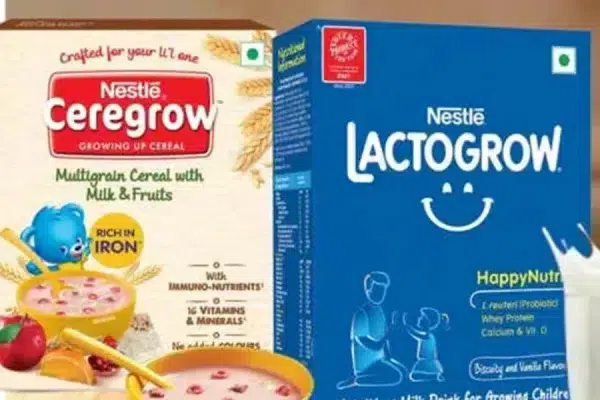New Delhi: An investigation report published by Swiss investigative organisation Public Eye has found that Nestle adds sugar in its baby food sold across poor and middle income countries including India, however for the same baby foods, it adds zero sugar in countries like US, United Kingdom, Germany, Switzerland, and other developed countries.
The Government of India has taken suo-motu cognisance of reports that Nestle reportedly added sugar to infant milk sold in India. “We have taken cognisance of the report regarding Nestle and will investigate the matter after doing due diligence”, media reports said.
Two of the best-selling baby-food brands by Nestle in India contain high levels of added sugar, while such products are sugar-free in the United Kingdom, Germany, Switzerland, and other developed nations, according to an investigation by Public Eye. The report said that Nestle, which is the world’s largest consumer goods company, adds sugar and honey to infant milk and cereal products in several countries, a violation of international guidelines aimed at preventing obesity and chronic diseases. Violations were found only in Asian, African, and Latin American countries.
However, a Nestle India Ltd. spokesperson told a TV news channel that the company has reduced the total amount of added sugars in its infant cereals portfolio by 30% over the past five years and it continues to “review” and “reformulate” products to reduce them further. “We believe in the nutritional quality of our products for early childhood and prioritise using high-quality ingredients,” it said in a statement.
Findings showed that in India, all 15 Cerelac baby products contain an average of nearly 3 grams of sugar per serving. The same product is being sold with no added sugar in Germany and the UK, while in Ethiopia and Thailand, it contains nearly 6 grams, the study said.
The amount of added sugar is often not even disclosed in the nutritional information available on the packaging of these kinds of products.
“While Nestle prominently highlights the vitamins, minerals, and other nutrients contained in its products using idealizing imagery, it’s not transparent when it comes to added sugar,” the report said.
Nestle sold over Rs 20,000-crore worth of Cerelac products in India in 2022. Experts say that adding sugar, which is highly addictive, to baby products is a dangerous and unnecessary practice.
“This is a big concern. Sugar should not be added to foods offered to babies and young children because it is unnecessary and highly addictive,” says an epidemiologist and Professor at the Department of Nutrition of the Federal University of Paraiba in Brazil.
“Children get used to the sweet taste and start looking for more sugary foods, starting a negative cycle that increases the risk of nutrition-based disorders in adult life. These include obesity and other chronic non-communicable diseases, such as diabetes or high blood pressure,” he added.
“In India, where sales surpassed $250 million in 2022, all Cerelac baby cereals contain added sugar, on average nearly 3 grams per serving. The same situation prevails in South Africa, the main market on the African continent, where all Cerelac baby cereals contain four grams or more of added sugar per serving. In Brazil, the world’s second-largest market, with sales of around $150 million in 2022, three-quarters of Cerelac baby cereals (known as Mucilon in the country) contain added sugar, on average 3 grams per serving,” the report by Public Eye has found.
The findings, first reported by the Guardian, further said, 29 of these products sold by Nestlé in some of the main markets in low- and middle-income countries while the result predicted that 21 of them (which is 72 percent) contained added sugar.
“For ten of these products, we were able to determine the amount of added sugar. On average, our analysis found almost two grams per serving. The maximum value – 5.3 grams per serving – was detected in a product sold in Panama,” it added.
Highlighting further, Public Eye said that it examined 115 products sold in Nestlé’s main markets in Africa, Asia and Latin America.
“No less than 108 of them (94 percent) contained added sugar. For 67 of these products, we were able to determine the amount of added sugar. On average, our analysis found almost 4 grams per serving, or about one sugar cube. The highest amount – 7.3 grams per serving – was detected in a product sold in the Philippines and targeted at six-month-old babies,” the report said.
Meanwhile, the Department of Consumer Affairs will follow the provisions of the Consumer Protection Act in asking the Central Consumer Protection Authority (CCPA) to check samples of Nestle’s infant food sample, sources said. Senior officials of Department of Consumer Affairs and Ministry of Health and Family Welfare (MoHFW) will discuss the matter soon.















